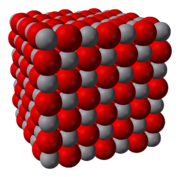Chemistry:Vanadium(II) oxide
From HandWiki

| |
| Names | |
|---|---|
| IUPAC name
Vanadium(II) oxide
| |
| Other names
Vanadium oxide
| |
| Identifiers | |
3D model (JSmol)
|
|
PubChem CID
|
|
| |
| Properties | |
| VO | |
| Molar mass | 66.9409 g/mol |
| Appearance | grey solid with metallic lustre |
| Density | 5.758 g/cm3 |
| Melting point | 1,789 °C (3,252 °F; 2,062 K) |
| Boiling point | 2,627 °C (4,761 °F; 2,900 K) |
Refractive index (nD)
|
1.5763 |
| Structure | |
| Halite (cubic), cF8 | |
| Fm3m, No. 225 | |
| Octahedral (V2+) Octahedral (O2−) | |
| Thermochemistry | |
Std molar
entropy (S |
39.01 J/mol·K[1] |
Std enthalpy of
formation (ΔfH⦵298) |
-431.790 kJ/mol[1] |
Gibbs free energy (ΔfG˚)
|
-404.219 kJ/mol[1] |
| Hazards | |
| Flash point | Non-flammable |
| Related compounds | |
Other anions
|
Vanadium monosulfide Vanadium monoselenide Vanadium monotelluride |
Other cations
|
Niobium(II) oxide Tantalum(II) oxide |
| Vanadium(III) oxide Vanadium(IV) oxide Vanadium(V) oxide | |
Except where otherwise noted, data are given for materials in their standard state (at 25 °C [77 °F], 100 kPa). | |
| Infobox references | |
Tracking categories (test):
Vanadium(II) oxide is the inorganic compound with the idealized formula VO. It is one of the several binary vanadium oxides. It adopts a distorted NaCl structure and contains weak V−V metal to metal bonds. VO is a semiconductor owing to delocalisation of electrons in the t2g orbitals. VO is a non-stoichiometric compound, its composition varying from VO0.8 to VO1.3.[2]
Diatomic VO is one of the molecules found in the spectrum of relatively cool M-type stars.[3] A potential use of vanadium(II) monoxide is as a molecular vapor in synthetic chemical reagents in low-temperature matrices.[4]
References
- ↑ 1.0 1.1 1.2 R. Robie, B. Hemingway, and J. Fisher, “Thermodynamic Properties of Minerals and Related Substances at 298.15K and 1bar Pressure and at Higher Temperatures,” US Geol. Surv., vol. 1452, 1978.
- ↑ Greenwood, Norman N.; Earnshaw, Alan (1997). Chemistry of the Elements (2nd ed.). Butterworth-Heinemann. p. 982. ISBN 978-0-08-037941-8.
- ↑ Tsuji, T. (1986). "Molecules in Stars.". Annu. Rev. Astron. Astrophys. 24: 94. doi:10.1146/annurev.aa.24.090186.000513. Bibcode: 1986ARA&A..24...89T.
- ↑ Groshens, Thomas J.; Klabunde, Kenneth J. (August 1990). "Molecular vapor synthesis: the use of titanium monoxide and vanadium monoxide vapors as reagents" (in en). Inorganic Chemistry 29 (16): 2979–2982. doi:10.1021/ic00341a025. ISSN 0020-1669. https://pubs.acs.org/doi/abs/10.1021/ic00341a025.
 |

